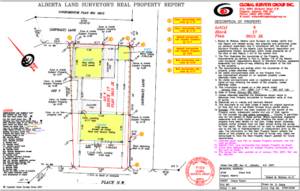 At some point in the process of buying or selling a home, you will need a lawyer. Here is a general outline of what the real estate lawyer does in the process, and why a good lawyer is important. Again, this is just a very general overview of how the process works in Calgary, where we live and work.
At some point in the process of buying or selling a home, you will need a lawyer. Here is a general outline of what the real estate lawyer does in the process, and why a good lawyer is important. Again, this is just a very general overview of how the process works in Calgary, where we live and work.
The lawyer comes in, usually at the end of the process and basically ‘closes the deal’. The most general and common tasks a real estate lawyer performs are:
- Taking care of the funds. The lawyer is essentially the ‘money mover’ between the buyer and the seller.
- Making financial adjustments for property taxes, HOA fees and other fees.
- Checking title, even though the realtor already should have done that, before writing an offer.
- Clearing title and making sure the new owner gets registered on title.
- Checking the Real Property Report (RPR) and making sure everything is in order and compliant with the (by)laws.
- Taking care of any holdbacks if they were agreed upon.
- Answering your questions during and after the process.
Moving the funds
If the home is not insured, the lender will not release the funds
Statement of adjustments
A real estate lawyer creates a statement of adjustments. Some examples that need adjustments are:
- The property taxes that need settling between seller and buyer. Often a possession is in the middle of a month. The seller has already paid property taxes for that month. Now the buyer must pay the seller back what he owes.
- Condo fees, which works the same as the property taxes. The buyer will pay the portion back for the days that the seller has already paid for.
- HOA fees (Home Owner’s Association Fees). Again, another fee, usually paid yearly, that needs adjustment if the seller has already paid these for the year.
- The lawyer also settles the deposit that was paid by the buyer, when the offer was written up.
The deposit goes towards your down payment
Checking and clearing title
Any adjustments such as condo fees and property taxes are done by the real estate lawyer
In short, the lawyer makes sure that the names of the old owners are being removed from title, and that the names of the new owners get registered on title. Title shows if the sellers have a mortgage. The lawyer makes sure the seller’s mortgage gets removed and the new mortgage from the buyer goes on title. But title can contain a lot more than just a mention of a mortgage. Title can expose many issues for which you may need a lawyer. To read more about what can be shown on title, go to land title search or pulling title.
A lawyer checks the Real Property Report
 The RPR, Real Property Report, is an important document that comes with every sale of a single family home, or with the sale of a bare land condominium. This document shows all the improvements on the land, such as the home and the garage, but also the air-conditioning. This RPR must be valid, meaning it must be updated and stamped by the City of Calgary for compliance. Any realtor should take this RPR and check it physically, on site, to make sure everything shows. If anything is missing, for example the newly built deck or garage are not showing on this RPR, the lawyer must be informed. Sellers often don’t have this RPR updated and stamped in time for closing. In this case, issues may arise, and a lawyer will handle these issues accordingly, and advise the client of any possible consequences.
The RPR, Real Property Report, is an important document that comes with every sale of a single family home, or with the sale of a bare land condominium. This document shows all the improvements on the land, such as the home and the garage, but also the air-conditioning. This RPR must be valid, meaning it must be updated and stamped by the City of Calgary for compliance. Any realtor should take this RPR and check it physically, on site, to make sure everything shows. If anything is missing, for example the newly built deck or garage are not showing on this RPR, the lawyer must be informed. Sellers often don’t have this RPR updated and stamped in time for closing. In this case, issues may arise, and a lawyer will handle these issues accordingly, and advise the client of any possible consequences.
Holdbacks
Any holdback must be written in the contract during negotiations, and in a correct manner
When the buyer receives the keys for the home, and the repairs are indeed done, as promised in the contract by the seller, then this holdback of funds will be released to the seller, as well.
This holdback must be written in the contract during negotiations, and in a correct manner! As well, for the reason of a holdback, it is important to also write a walkthrough into the contract, 24 hours before possession.
What is the role of the lawyer on possession day?
The Alberta contract states that possession takes place on a particular date at 12 noon. At that time, the buyer receives the keys to his new home. A simplified version of the most common scenario on that day goes as follows; In the morning, the buyer’s lawyer receives the funds from the lender. The lawyer moves the funds to the seller’s lawyer. Once the seller’s lawyer has received the money, this seller’s lawyer will tell the seller’s realtor that the keys are releasable. The seller’s realtor informs the buyer’s realtor that the keys are releasable. The buyer’s agent will contact the buyer to meet and hand over the keys.
The complicated version of this scenario is when the lender doesn’t transfer the funds on time to the buyer’s lawyer. Now the buyer’s lawyer has no money to give to the seller’s lawyer, and the seller’s lawyer can’t give the go-ahead to release the keys. That is just one of the (many) complications that can arise. It can result in a late payment to the sellers. The sellers could still give permission to release the keys and allow possession on a tenancy-at-will basis to the buyers, and late payment fees are in effect for the buyer.
What if you receive the keys and the sellers left a damaged house?
Your lawyer is your best friend when issues arise on the RPR
If there wasn’t any holdback written in the contract, all the buyer’s lawyer can do is contact the seller’s lawyer in the hope that both lawyers come to a fair solution. If lawyers don’t come to any agreement, the only option for the buyer is to sue the sellers for damages afterwards, in civil court. This is one of those issues where you can find out about the strengths of your lawyer.
A walkthrough before taking possession
A walkthrough must be negotiated and written into the contract and needs to contain the correct wording to make it valid and binding. If it is not in the contract, any lawyer will tell any realtor that a walkthrough is not allowed, before handing over the keys on possession day.
However, even when this walkthrough is written correctly into the contract, the buyer’s lawyer is still not allowed to hold back funds unilaterally, when, for example, there is damage or missing appliances. In such a scenario, the buyer can inform the lawyer about the damage, and (hopefully) both lawyers can work it out. However, it is never a guarantee.
Can you use the lawyer from the builder?
Never use the lawyer of the builder. A lawyer can only serve one party!
How do you find a good real estate lawyer?
We have been in business since 2009, and we have been asked this question often! We are able to refer our clients to lawyers who have proven to be good and honest. These are lawyers whom we have referred clients to over many years. As realtors we can always call them in case we run in any issues, or in case we have questions. That is our motivation; we refer our clients to any of several lawyers, and in return we can ask them questions, if needed. Sometimes clients already have their own lawyer, and sometimes clients ask around at work or in the family. Whatever way you find yours, make sure it is a real estate lawyer!
Where in the process do you need a lawyer?
We advise any buyer or seller to find a real estate lawyer as soon as possible. You never know what may come up, or what questions may arise during the buying or selling process. Having a ‘life line’ on speed-dial can give peace of mind, knowing that the best advice, and the right answers are there when you need them.
Make sure your lawyer is a real estate lawyer. Real estate lawyers have the vast volume of the necessary education and experience to merit a fair price.
What does a real estate lawyer cost?
On average, in Calgary, the rates for real estate lawyers can vary roughly between $850 and $1200. On top of that you will have to pay disbursements that the lawyer must pay on your behalf. Pulling title, filing your title with Land Title Office, courier fees etc. add several hundred dollars to their fee.
Above is a very general outline of the work a real estate lawyer does in the sale or purchase of a property. As mentioned, this outline is only valid in Calgary, Alberta where we live and work.
Please note: The above is general information and not considered legal advice. We do our best to write informative articles about real estate in Calgary, Alberta. If you have any questions or concerns about our comments, please feel free to contact us or speak to your legal advisor.